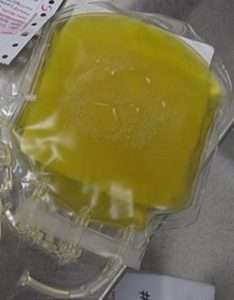The Volokh Conspiracy
Mostly law professors | Sometimes contrarian | Often libertarian | Always independent
"Bloody Well Pay" Blood Plasma Donors - and Organ Donors, too
Georgetown political philosopher Peter Jaworski makes the case for paying blood plasma donors. The same arguments also justify paying organ donors and participants in vaccine "challenge trials."

In a recent report co-published by the Adam Smith Institute, the Niskanen Center, and the Australian Taxpayers Alliance, Georgetown political philosopher Peter Jaworski argues that nations that currently ban paying blood plasma donors - including Canada, the UK, and Australia - should legalize it. As he puts it in the title of the report: "Just Bloody Well Pay Them." Here is a summary of his report, posted at the Niskanen Center website:
-
There are significant global shortages of blood plasma used to make plasma therapies. Demand is growing at a rate of 6-10% per year. Three-quarters of people do not have access to the appropriate plasma therapy, largely outside of developed countries.
-
Shortages are significantly exacerbated by the World Health Organisation's policy — adopted by the United Kingdom, Australia, New Zealand and some Canadian provinces — to rely exclusively on Voluntary Non-Remunerated Blood Donations (VNRBD).
-
The United Kingdom currently imports all (100%) of its supply of plasma therapies, Canada four-fifths (84%), Australia half (52%), and New Zealand one-tenth (13%). These countries are too increasingly dependent on imports of plasma therapies from countries that remunerate donors such as the United States and Germany. This inflates the global blood plasma price, making it unaffordable for low to middle income countries.
-
5% of the world's population is responsible for more than half of all the plasma collected in the world.
-
In order to ensure a safe, secure, and sufficient supply of plasma therapies, the United Kingdom, Canada, Australia, and New Zealand should adopt Voluntary Remunerated Plasma Collections (VRPC).
As Jaworski explains, the US currently does allow payments to donors, and thereby provides a high percentage of the world's total supply of blood plasma. But shortages persist because so many other countries forbid it.
Jaworski provides excellent responses to a variety of standard arguments against paying donors, such as that it might lead to "exploitation" of the poor, or to "crowding out" of unpaid donations.
It is important to recognize that many of the issues raised here are similar to standard arguments against paying organ donors and paying participants in vaccine "challenge trials." In each of these cases, critics claim that allowing payment would exploit the poor, improperly "commodify" the body, and lead to deception and trickery at the expense of ill-informed donors. And, in each of them, policies banning these practices cost many lives, as well as inflicting other types of suffering. For example, the US ban on paying kidney donors leads to thousands of preventable deaths every year and consigns many thousands of other patients to years of painful kidney dialysis.
I criticized the "exploitation" and "commodification" arguments in the challenge trial context here, and in the organ transplant context here and here. I would add that legalizing these practices would also expand human freedom, and should be attractive to anyone who believes in the principle of "my body, my choice," and takes its implications seriously.
Last year, the Trump administration eased regulations restricting restricting the compensation of kidney donors for the expenses they incur as part of the donation process. This is an important step in the right direction. But much more can be achieved by also legalizing payments that go beyond simply compensating people for expenses. In most other cases, we don't expect to adequately meet the demand for any good or service simply by paying producers for some of the expenses they incur. We recognize that they also need to be able to make a profit - as in fact is allowed for every other participant in the kidney transplant process, including doctors, nurses, producers of medical supplies, and so on.
Allowing payment of organ donors, plasma donors, and participants in vaccine challenge trials is a great way to simultaneously save lives and expand human freedom. At this painful moment in history, it could also help put an early end to the coronavirus crisis, thereby limiting the enormous economic and social damage it causes.


Show Comments (8)